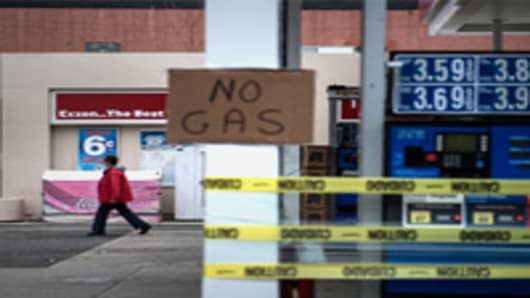Gas is a good that is extremely susceptible to the temptation to hoard. It doesn't go bad under any reasonable period of time, which means that there's no penalty for purchasing excess stock in a time of shortage. The only way to discourage this is by explicit rationing or by allowing the price to increase, making people pay a higher price during the shortage.
(Read More: What Super Storm? Gasoline Prices Fall)
I haven't been able to find one economist in favor of the anti-gouging laws. My explicit call for an anti-gouging law supporter on Twitter was met with silence. People from across the political spectrum—Matt Yglesias at Slate to Holman Jenkins at the WSJ—have condemned the laws.
There's good reason for the widespread condemnation of anti-gouging laws: they are—almost—universally harmful. There's no public good or special interest benefited by the laws. And especially when it comes to necessities like gasoline, the harm they do is sharply felt by a large part of the population.
So why do we have these stupid laws at all?
A lot of people suppose that the anti-gouging laws are a remnant of some puritan past, like laws that ban buying alcohol on Sundays. But they aren't. The first one was passed in New York in 1979 in response to rising heating oil prices, according to an essay on the laws by Michael Gibberson published in Regulation last year. Three more states adopted similar laws in the 1980s, eleven more in the 1990s, and 16 in the last decade. These aren't ancient blue laws—they are a growing legal innovation.
Again you're probably asking: why?
As it turns out there is one set of actors who does benefit from these laws—politicians. Anti-gouging laws allow politicians to appear as if they are defending the interests of the people in a time of crisis—even if they are actually doing nothing of the sort. The politicians who vote for the laws tout them as "consumer protection" and the politicians who enforce them almost always do so loudly and obviously, condemning profiteers. The typical impotence of politicians in the face of a crisis is concealed by their intervention against higher prices.
This malarkey is made possible because there is no visible, directly observable connection between the shortage and the price-control. It takes at least a moment's concentration to connect the dots, and the politicians do everything they can do prevent such concentration from happening.
Perhaps Sandy will be the undoing of this great con job. Our gasoline shortage should put an end to the illusion that the laws are helping. Very clearly, if the price of gas went up to $8 a gallon, the guy four cards ahead of you on line might not be filling his seven extra tanks of gas.
(Read More: NJ Investigating Reports of Price Gouging)
Here's a challenge: some brave politicians should declare a free-trade zone in gasoline. Allow prices to rise without control. See how quickly gasoline gets restored to empty stations in the free-trade zone, see how short the lines shrink.
(Read More: Gas Shortages May Not End for a Week)
Or, better, Governors Cuomo and Christie should just announce that prices may rise. Suspend the laws, just as the Obama administration has suspended protectionist shipping rules to allow international ships to move fuel between U.S. ports.
Continuing our current policy of inducing shortages to benefit politicians is simply unacceptable.
Follow John on Twitter. (Market and financial news, adventures in New York City, plus whatever is on his mind.) You can email him at john.carney@nbcuni.com.
We also have two NetNet Twitter feeds. Follow CNBCnetnet for the best of the days posts, including breaking news. Follow NetNetDigest for a feed of every single post each day.
You can also be our friend on Facebook. Or subscribe to John's Facebook page.
We're on Google Plus too! Click here for John's Google page.
Questions? Comments? Tips? Email us at NetNet@cnbc.com or send a text message to: 917-740-8477.
Call us at 201-735-4638.



